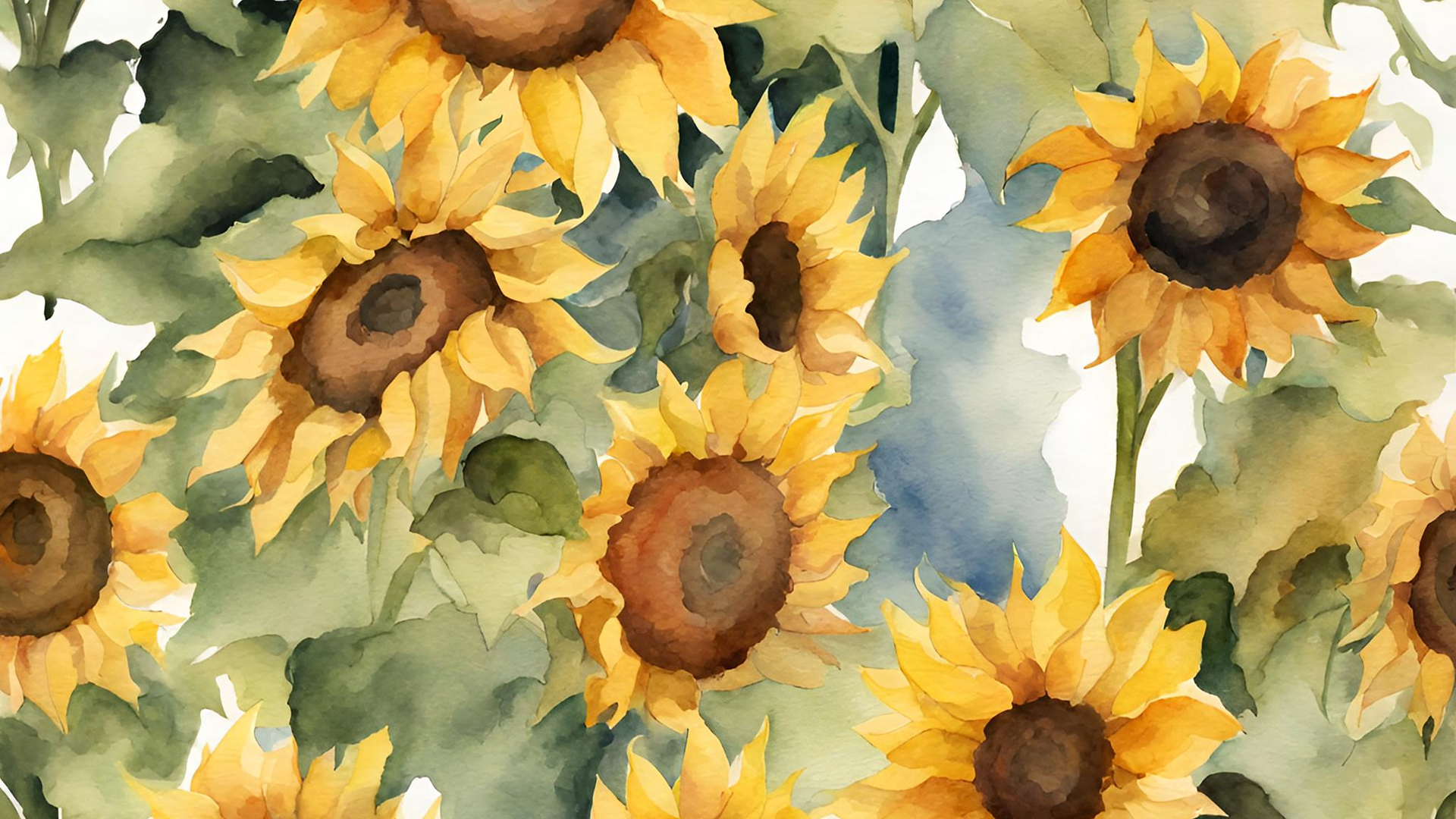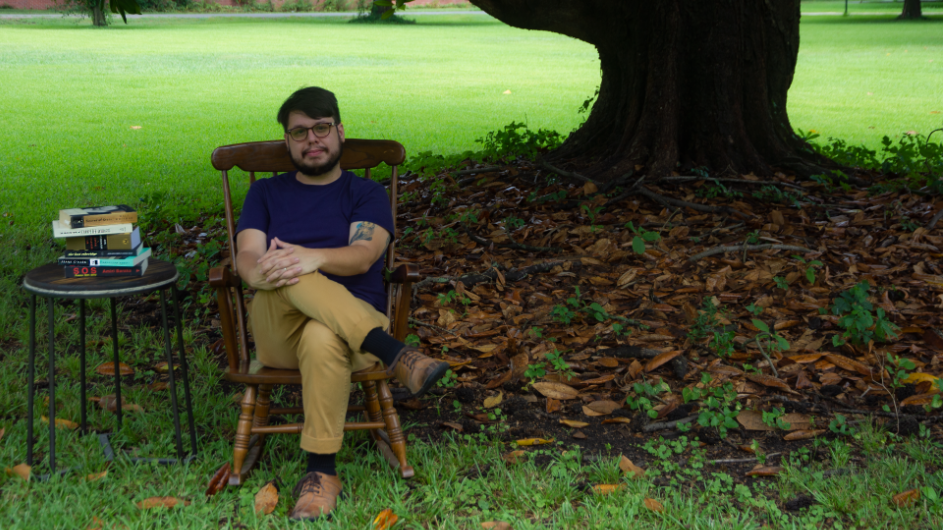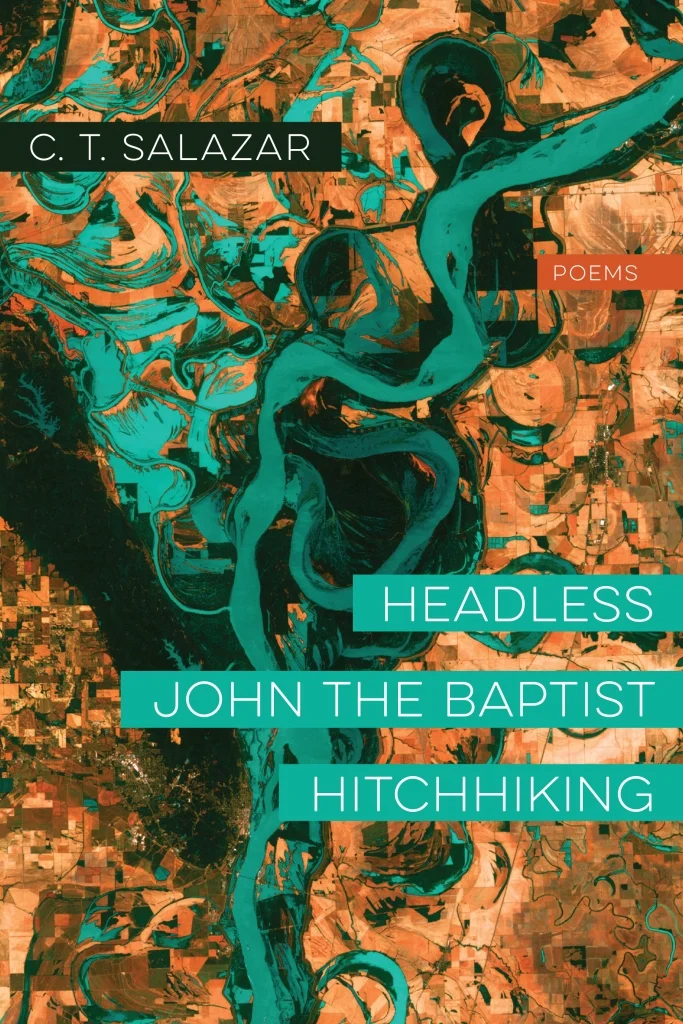
Just the Right Amount of Sunflowers
Three dazzling new poems by Mississippian C.T. Salazar, and an interview on binaries, ecologies, and the mysteries of time.
You can’t read C.T. Salazar’s poetry the way you read other poets’ work. He’s not going to tell you a direct, stable, linear story that follows Freytag’s pyramid—introduction, rising action, climax, falling action, resolution. Salazar instead drops readers into a well of Southern consciousness—the fraught, charged, and ever-tilting world of our region.
You won’t see a lot of punctuation, but you will see some extra white space. It’s not exactly stream-of-consciousness writing, but his poetry is a stream that, as a reader, you must allow to flow. His writing is not exactly linear because the history of his home state isn’t either. As he told River Heron Review, Mississippi’s “history is not linear as we think of it, because Mississippi has relics in its everyday life from the 19th century, from the 20th century.”
Salazar is also a pianist, and he builds images like chords, seeking surprising connections between dissonant notes, between tension and resolution. He likens that to his own “personal competing narratives of being a Southerner and being Latino, and those are two very competing narratives. But, I live in this one body, so there is some resolution in trying, in the body of the poem, to find that resolution. This always leads to this combination of really odd, juxtaposed images.” That searching, layering of imagery is my favorite thing about his work, which operates on both the edges and depths of perception.
Perhaps most importantly—just from a basic, reading-along standpoint—remember that a line of poetry isn’t the same thing as a sentence. A sentence can carry across many lines, but in a poem, moving from one line to the next can shift the meaning. This is especially true when there’s scant punctuation: at times, the images and epiphanies might blur together, and at other times they’ll fragment.
In another interview with Southern Review of Books, C.T. explains this: “It’s very much the archivist in me, but I’m infatuated with fragments, [...] how a fragment is open on all sides, as opposed to a sentence which is kind of a closed system.”
His first full-length book, 2022’s Headless John the Baptist Hitchhiking, is full of such openness, with its dazzling and at times surreal imagery and its jarring associative leaps (“I stepped into a gown of moonlight / I thought I knew this town”). Reading Salazar, you walk among the many forms of love, desire, and identity.
When River Heron Review editor Judith Lagana asked him what skill or attitude he would bequeath to other poets, Salazar responded with three:
- You can love something and still criticize it.
- Vulnerability means you’re willing to love yourself and your subject in ways that could put you at risk.
- Joy is worth the risk.
C.T.’s work is very much about how our understanding—of love, gender, history, belonging—is ever-shifting, and ever-worthy of our attention. So is his poetry.
—Andy Fogle,
Salvation South poetry editor

C.T. Salazar reading his poem “Ode,” from his book Headless John the Baptist Hitchhiking

O Ye Cattle Thieves
in your city I say thank you
I thought I was a visitor to the death machine
but actually I am a citizencitizennour last governor killed us
our new one puts on a white apron every morning
thank youonemy father used to whisper it into the phone
and I knew debt was a golden guillotine some men
watched sway over their childrengoldeI’m worried
these are the wrong questions entirely like what happens
if your copper-bottomed heart catches
too much rainmucand who is watching the police
watch youyouif God is out naming fireflies after jurors
who helped convict innocent people, if the propaganda
says you can be innocent what would you trade for that I smell the pines
on you do your hands hurt from holding them against your father
’s antlerscandoes our slow death
have a flag we could burn
The Boy Elijah Raised Remembers His Last Night Alive
on your temple my finger your
swirling ram’s horn horn the sky was trans
-gressing soft soft the ideas blue but
bourboning with lightbourbonssstill like
time I am most valuable when stolen
like the time I shared a glass of wine
with flies the next day Holy Ghost
of a cloud they made the the nights
I was a briar patch for your catching
everyone talked about the future like
we’re not in it but I know love by the roadkill
it makes of its distractions
I stepped into a gown of moonlight
I thought I knew this town
from NOTES FROM THE FEDERACY
acorn’d world th the
blue worldth the
croaking world at night the
dark green world right beforeththe
empty of all music world andththe
full of its sound worldsound wsthe
given world
PollenPollenhidden
PollenPollenPollenin enough fog the ancient and the
PollenPollenPollenjust born world the
PollenPollenPollenknobby cypress-swamp
PollenPollenPollenloblolly pine’d and
PollenPollenPollenmoon-studded worldthethe
PollenPollenPollenno amount of wealth could replace this world
PollenPollenPollenor the way I feel when I hold your hand in it the the
acorn’d pollen-pursuing worldthethe
acorn’d quiet as we stare into the flickering fire worldthethetthe Ozarks with
acorn’d ryan cass stella alicia cody ian cameron jon just the right amount of
acorn’d sunflowers in that field over theretheover here world
acorn’d take your time watering the plants the
acorn’d upside to this world
acorn’d vapor as it is s whole
acorn’d world


Fourteen Questions for C.T. Salazar
1. Where’d you grow up and what was it like?
I grew up on the far eastern side of Mississippi up against the Alabama state line. A lot of the architecture of that space trespasses the line between the past and present—as a hospital town in the Civil War, it’s one of the few cities that wasn’t decimated, so a lot of the architecture and landscape is antebellum. Of course, the collective consciousness of the role of the Confederacy and the transatlantic slave trade has still been the victim to heavy revision and Lost Cause-based willful misinterpretation, even in a town in which the artifacts of this violence are readily available. In the country there are barns that were built by hand in the 19th century still standing along the highway, decommissioned roads you can stumble on in the woods, abandoned cemeteries that look less like cemeteries every year.
2. How do you feel about being a Southerner: proud, ashamed, both, otherwise?
The older I’ve gotten, the less productive shame feels. I love the people in my state. I’m proud to be in the middle of a place whose liberation is still yet to become. I haven’t found anything more beautiful to witness than an ongoing liberation, but I know the future of it will be even more so. I’ve been in the Mississippi Delta region for three years now because the work called me here and I took the first opportunity to get here. Here, the work feels measurable. The wins are less abstract because it’s people demanding better material realities, and as that reality comes, we can recognize it. In the belly of the beast, there are everyday people living and imagining a better future for everyone.
3. Have you ever left the South for any significant period? If so, did it have any effect on how you understood the region, or how you understood other regions?
I’ve only ever lived in Mississippi, but I’ve traveled a good bit all over. Being elsewhere has shown me how the lines we draw are arbitrary. We are inseparable to the Global South and everywhere else. “Tied together in the single garment of destiny” is how [the Rev. Dr. Martin Luther] King described it. There is no “elsewhere.” Even in the South, we are directly next to the suffering of our Palestinian neighbors. To the hardships of our Black, Brown, and working-class neighbors living in the neoliberal policy labs of bigger cities like Chicago. The oppression of anyone is a direct insult to our own lives, and I don’t think anyone knows that better than a Southerner.
I think there’s a huge element of ignorance about the South—that we somehow deserve our disenfranchisement—it’s not hard to identify the anti-Black sentiments in it.
4. Do you have any sense of whether other parts of the United States are seeing the South differently? And does it matter whether they do or don’t?
I wish I had a good answer for this question, but I honestly don’t know. As someone who directs an esteemed university archive, I interact with researchers and academics from all over whose projects are situated in the Mississippi Delta, but those are folks who have “done their homework” on why the South (and why their own home) is the way it is. I think there’s a huge element of ignorance about the South—that we somehow deserve our disenfranchisement—it’s not hard to identify the anti-Black sentiments in it. Whether or not it matters, or to what scale it matters, is something I’ll have to think about.
5. Is there anything you’d like to say about any of the poems we’re publishing (anything about their origin, evolution, or otherwise)?
“The Boy Elijah Raised Remembers His Last Night Alive” is from a series of sonnets reimagining the child killed and resurrected in the Old Testament as a queer boy in the Mississippi Delta.
6. Who are some contemporary Southern poets or poems we should know about and why?
Destiny Hemphill. That’s a poet really putting language for the future to come and it’s incredible to see it work. Melissa Ginsburg’s Doll Apollo from LSU press was seriously one of the smartest collections I’ve read in a long time and that book deserves so much hype. Stacey Balkun in New Orleans—an all-around generous poet and person. The forms at work in her collection Sweetbitter really enacted a lot in me. Aurielle Marie in Atlanta, Ashley M. Jones in Birmingham, Cody-Rose Clevidence in the Ozarks. The list can—and does—go on forever.
7. Tell us about a great poem about an issue facing your South.
Oh, man. I’m really thinking about Natasha Trethewey’s ghazal “Miscegenation” lately. The first couplet is:
In 1965 my parents broke two laws of Mississippi;
they went to Ohio to marry, returned to Mississippi.
Thinking about the year just after Freedom Summer in ’64 and all the terror and triumph Mississippi saw. Medgar Evers: assassinated with no conviction after three trial attempts. Chaney, Goodman, and Schwerner the young college students working with SNCC: killed. The hundreds of documented fire-bombings of churches and freedom schools across Mississippi. The mass jailings of Southerners and non-Southerners working together. The dogs let off-leash into crowds who were positionally nonviolent. That during all of that, there’s two people that could love each other enough to flee state lines to marry legally as a white man and a Black woman. And return! To come back to Mississippi and face the burning cross in their yard (that Trethewey details in another poem). All of this happened in the very recent past. I talk to people every day who lived through this. I walk among the absences every day of those who didn’t survive it.
Poetry brings back the past that was already among us to begin with—with a language we recognize as a sort of present. There’s something poetry does about diminishing the conceptual past/present/future that makes it all feel a lot less inevitable.
8. What’s a poem from another era that’s close to you and why?
I really love the English Romantics. There’s a poem by William Wordsworth in the 1802 edition of Lyrical Ballads called “Animal Tranquility and Decay.” The poem sets up this really strange perspective with the first lines: “The little hedge-row birds / That peck along the road, regard him not.” Like, the first glimpse we get of this guy we’re supposed to see in the poem is from the perspective of some birds, who are in fact not seeing him. It’s a short poem watching this quiet man move along. It’s pastoral in the traditional sense of the term. When Wordsworth’s speaker finally interacts with him twelve lines later, we get:
I asked him whither he was bound, and what
The object of his journey; he replied
That he was going many miles to take
A last leave of his Son, a Mariner
Who from a sea-fight had been brought to Falmouth,
And there was dying in a hospital.
And that’s where the poem ends. This pastoral is trying to be a pastoral, but something’s interrupted it. Even out in an idyllic stroll for an attempt to understand something beautiful about the world, Wordsworth cannot escape the Napoleonic wars. Because it’s happening somewhere else, it’s still part of the ecology to what the poem is trying to take in even where they are. The poem wasn’t ready for it; the shock of it, of knowing the war got in, shut the pastoral down.
It’s meant the world to me that other Southerners have told me how they see themselves in my work. It’s so funny because in the beginning I thought I was writing in a language too private for anyone to connect with.
9. What role does poetry play in understanding the South’s past, recognizing its present, and influencing its future?
I think it gives us the language to be restless in the pursuit of a future. Also to interrupt the tyranny of linear time. Poetry brings back the past that was already among us to begin with—with a language we recognize as a sort of present. There’s something poetry does about diminishing the conceptual past/present/future that makes it all feel a lot less inevitable. The way we otherwise talk and think about time has a strange production of inevitability for everything we’ve been through and everything we’re going through. Poetry gives us a space where we can think outside of that.
10. You’re a librarian. What’s that like for you at the everyday local level, and what’s it like when you think about the profession from a national level, with a politicized scope? Are they separate lenses? Do they merge?
I think they merge in how burnout feels at a local level. As neoliberal privatization guts more and more public infrastructure, libraries become one of the few spaces built for folks without certain semi-predetermined entry points of economic and social capital. When these libraries don’t have the resources to sustainably fill the void of all this public gutting, that shows up in labor over-extensions and expectations of the library staff on the very bottom. Somehow the political contexts of libraries at the national level is not really talking about this. I will say, I’m privileged enough to be in a wholly different context right now: I’m the director of a university archives, and academic libraries are not identical in the labor operations of caring for a community’s most vulnerable population. As an archive director, my daily attention is on the preservation and promotion of a large collection of primary documents and artifacts, as well as overseeing the operation of three museums under the archive’s purview, with all the exhibit building and facility maintenance that comes with them.
11. You have a Southern Baptist mother and a Latino Catholic father. How does this influence your work or life?
It influences my writing a good bit because the language of the King James is something that’s always with me, and showing up in my writing. It gives me archetypes to explore, play with, and upend in language.
12. Your poetry has this dazzling, hypnotic mix of theology, surrealism, and charged vulnerability, simultaneously intimate and otherworldly. I wonder if that mix is like your experience of the South itself.
It absolutely is. It’s meant the world to me that other Southerners have told me how they see themselves in my work. It’s so funny because in the beginning I thought I was writing in a language too private for anyone to connect with. The more I started publishing the more I found that’s not the case at all.
13. I want to thank you for that vulnerability, by the way, especially when it is still not a quality that strikes me as part and parcel of being a man in this culture. I think we might be getting there, but what do you see?
I think on the whole, men are so worried about being perceived as feminine and not worried enough about how unempowered and unsafe women feel around them. Definitely the patriarchal structure has done significant psychic damage to how we see ourselves and what we perceive as possible. I’m more gender-fluid and nonbinary, so I may not even be the best person to speak on this. I do agree with you, that other modes of being and the language of that being has been more accessible and there’s a lot of folks (around me at least) getting out of the strict (and deadly) perception of binary. When I think of the men in my family, and the deeply taught qualities of masculinity in Latino culture, I know the work of helping all of us imagine something better is still in front of us.
14. The brilliant cover for Headless John the Baptist Hitchhiking looks like some kind of blue spirit, but is actually a U.S. Geological Survey topographical map of the Mississippi River. It’s a visual echo of what seems to be a thread in your work about the slipperiness of perception and interpretation. It strikes me that such flexibility of meaning and angles frustrates people when they’re related to politics or social issues, and yet such patience and flexibility with complexity is just what we need. Like, if more people spent more time engaging with the arts, maybe we’d all be better off. Am I fucking crazy to think that?
I have to shoutout the Acre Books team because none of the cover was my idea. They make beautiful books and I’m so fortunate they saw Headless and wanted to make the best version of it. I agree that it’s frustrating to not have easy answers. But easy answers will only carry us as far as we are right now. Easy answers give us one dimensional representational politics that don’t really represent us at all. I think there’s something so precious about working through the mess of not having an easy answer. Of tending to a question for years. Carrying questions past generations of people and all the embodied knowledge that gets inherited, misheard, or sometimes lost entirely. Headless is built out of the same few questions I had for almost seven years, many I’m still asking now. Getting comfortable with not knowing doesn’t have to be a stalling effect. On the contrary, I think it’s actually productive to not know an answer.
C.T. Salazar is a Latinx poet and librarian from Mississippi. His debut collection is Headless John the Baptist Hitchhiking (Acre Books, 2022). He’s the author of three chapbooks, most recently American Cavewall Sonnets (Bull City Press, 2021). He’s the 2020 recipient of the Mississippi Institute of Arts and Letters award in poetry. His poems have appeared in The Rumpus, Beloit Poetry Journal, Cincinnati Review, 32 Poems, RHINO, and elsewhere.


